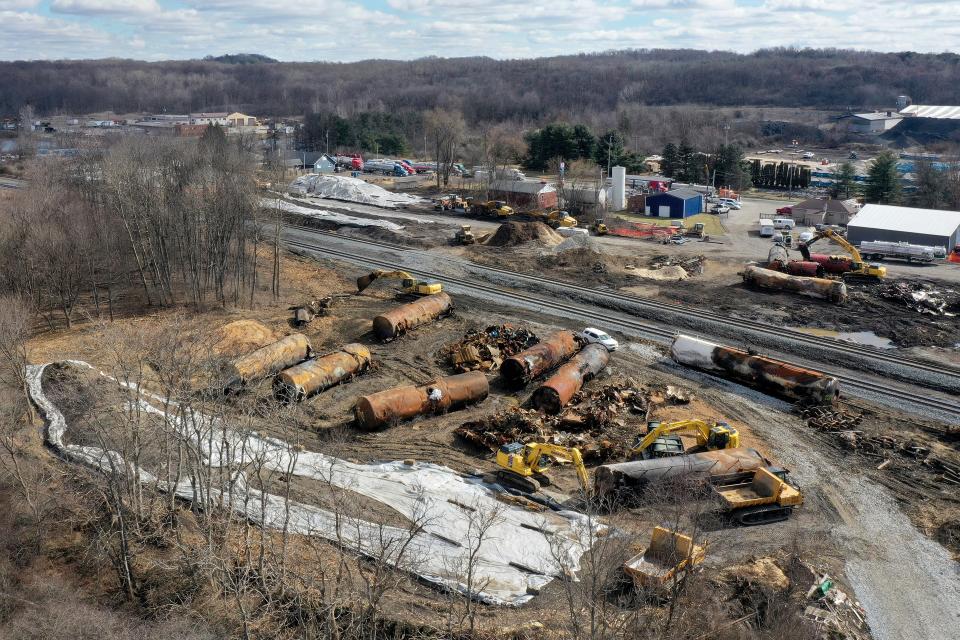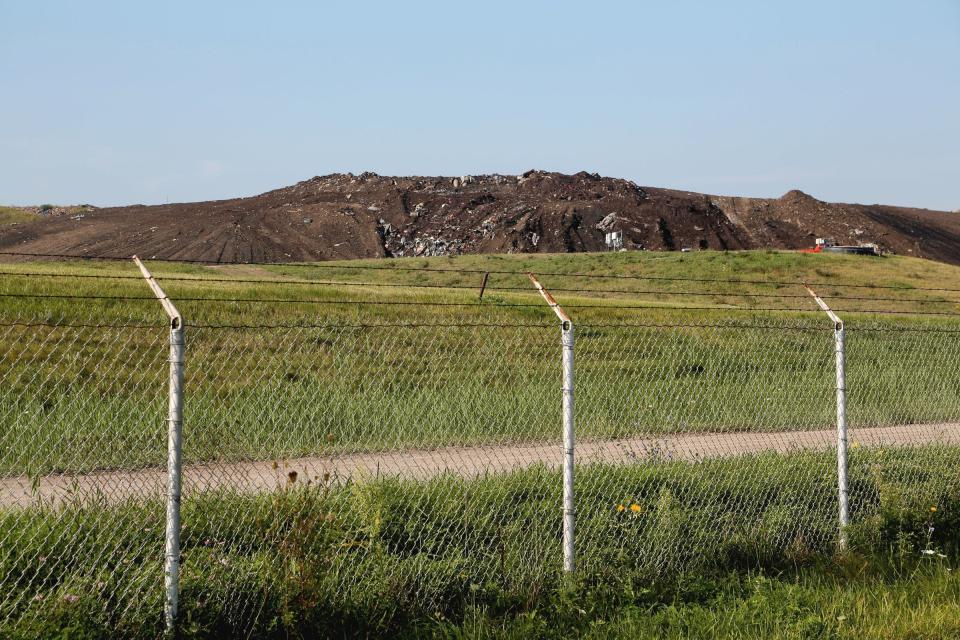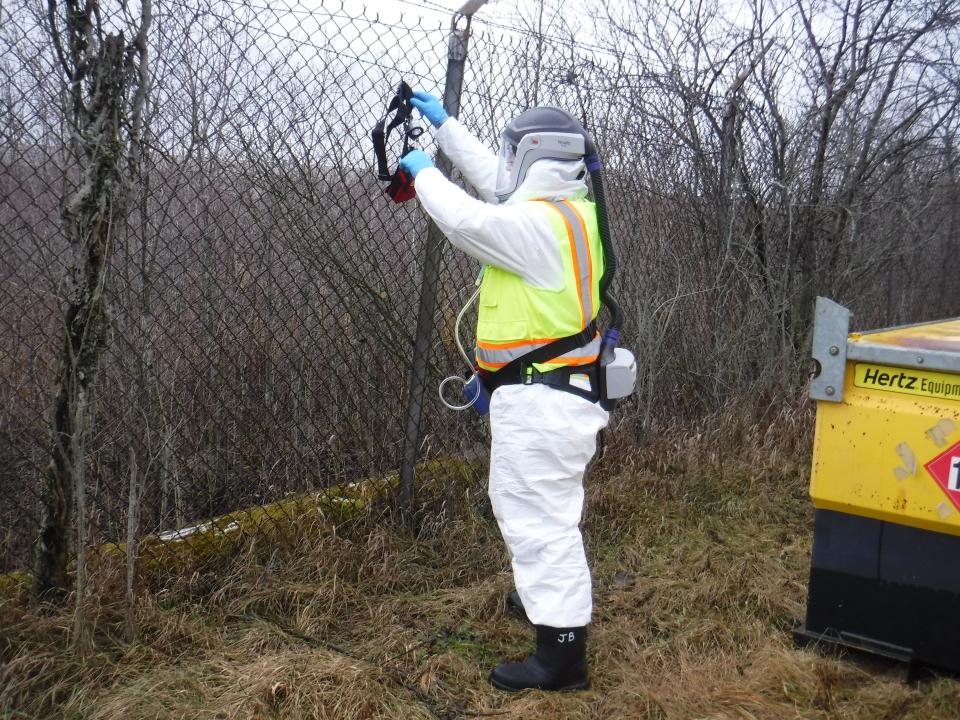Ohio train derailment wastes no longer coming to Michigan — but hazardous waste still flows into state
Shipment of hazardous wastes from the East Palestine, Ohio, train derailment to Michigan, which were halted Friday amid public outcry, will not resume — though other toxic wastes come to Wayne County sites routinely.
Tons of hazardous materials — including some more potentially hazardous than those coming from East Palestine — flow into Michigan daily.
Last week, Ohio Gov. Mike DeWine announced that large dump trucks were transporting more than 4,800 yards of contaminated soils from the derailment site to US Ecology's Wayne Disposal hazardous waste landfill in Van Buren Township off Interstate 94. An unspecified volume of liquid hazardous wastes from the Ohio site were also transported to a hazardous waste injection well nearby in Romulus. Both facilities are owned by waste disposal giant Republic Services.
That prompted loud, instant outrage from Michigan officials and the public.

Dingell: 'It's not coming here anymore'
"No one gave us notification about the transferring of this material," said state Sen. Darrin Camilleri, D-Brownstown.
Added Huron Township Supervisor David Glaab, who chairs the Conference of Western Wayne, an organization of 18 communities in western Wayne County, "We don't want Ohio's problems to become Michigan's problem."
The decision to use Republic Services and the Michigan hazardous waste disposal facilities was made by Norfolk Southern, the railroad involved in the Ohio derailment, said U.S. Rep. Debbie Dingell. The Environmental Protection Agency took control of the cleanup on Friday, and responded to Michigan's calls to stop shipments here, she said.
"EPA played a critical role in the pause, and it's not coming here anymore," said Dingell, D-Ann Arbor.
More: EPA rejects DTE's continued use of coal ash basins at Monroe, Belle River plants
More: Eating locally caught freshwater fish can put PFAS in human blood, study says

Neither US Ecology nor EPA officials responded to Free Press requests for comment. At a news conference Monday, EPA Region 5 Administrator Debra Shore said three EPA-certified waste disposal facilities in Ohio had been identified to accept the liquid and solid wastes, as well as a hazardous waste landfill in Roachdale, Indiana.
"We had promised to notify elected officials and our state agency partners before approving the shipment of any derailment waste to their state or district, and we have done that," she said.
"We will continue to evaluate options for safe and proper disposal facilities with the capacity sufficient to handle the needs of the cleanup."
Wayne Disposal landfill takes hazardous wastes from many states
Hazardous wastes from a large chemical spill following a train derailment is an unusual event that garnered tremendous news media attention. But Republic's Wayne County hazardous waste facilities regularly take in other states' toxic waste for treatment and disposal, garnering virtually no attention.
On US Ecology's website, the company declares itself open for business for anyone's hazardous waste disposal needs.
"US Ecology is the leader for landfill disposal solutions for hazardous and non-hazardous waste streams including PFAS, PCBs, NORM/TENORM radioactive, inorganic, metal and industrial waste," the website states.
More: Landfill taking radioactive waste has history of violations, leaks, fires
More: Most of Michigan's 24,000 contaminated sites await cleanup that might never come
'No requirement to notify state or local officials'
Officials with the Michigan Department of Environment, Great Lakes and Energy responded to Free Press inquiries with a "fact sheet" statement Monday.
"The landfill and injection well facilities regularly handle both Michigan and out-of-state hazardous waste," the release states.
"Federal and state statutes require detailed manifests of deliveries be kept, but no requirement to notify state or local officials of individual shipments that arrive or are processed."
EGLE staff learned of the disposal of contaminated soils from East Palestine on Thursday afternoon, and about the disposal of liquid hazardous wastes here on Friday afternoon, the agency's fact sheet states.
The Republic injection well in Romulus was found to be out of compliance with environmental regulations during a July 2022 inspection by EGLE staff. Findings included inadequate waste identification, manifesting and labeling; liquid containment modification without required modifying of permits; facility inspection requirements not being met, and "improper tank system requirements," EGLE's release states.
Violations and fracking waste
The violations were addressed by the time of an EGLE follow-up visit in October. The agency is developing an administrative consent order and potential penalties for the company.
In an inspection Jan. 11 of this year, EGLE staff again found violations at the injection well — "hazardous waste violations related to container labeling and alarm system function." The problems were addressed during the inspection, EGLE staff stated.
"The facility is currently considered in compliance and able to process and dispose of hazardous waste," EGLE's release states.
The Wayne Disposal landfill previously generated controversy when it accepted some 36 tons of oil and gas fracking wastes from Pennsylvania containing elevated radioactivity, so-called TENORM waste, that two other states had previously rejected.

The landfill in 2017 also took tens of thousands of cubic yards of low-level radioactive waste from a long-shuttered beryllium plant in Luckey, Ohio. The plant supplied the strong, light but highly toxic metal to the U.S. military and Atomic Energy Commission in the 1940s and 1950s.
But in its day-to-day operation, most of what is coming into the Wayne County hazardous waste facilities receives virtually no attention.
The East Palestine derailment hazardous waste being shipped to Michigan "raises the question of what other types of materials are being sent to these facilities, and how would we know?" Camilleri said.
U.S. Supreme Court case on Michigan landfill resonates today
Preventing other states from bringing their hazardous wastes to Michigan landfills and disposal facilities is virtually impossible, thanks to a 1992 U.S. Supreme Court ruling on imported garbage.
St. Clair County officials attempted to prevent a local landfill from accepting out-of-state waste, and Michigan's Solid Waste Management Act at the time required a county to approve such imports. The Fort Gratiot Sanitary Landfill Inc. sued the state, and the case reached the U.S. Supreme Court, where justices in a 7-2 opinion in June 1992 declared the trash "articles of commerce" — essentially a commodity or good — whose interstate commerce could not be restricted under the Commerce Clause of the U.S. Constitution.
"States can't prohibit the flow of goods and products across state borders that way," said Nicholas Schroeck, an associate professor of law at the University of Detroit Mercy's School of Law.
"If Michigan wants to restrict imported waste, it can raise its fees, make it more expensive to import these materials, or not permit or license those waste-receiving facilities in the first place."
Once in place, a hazardous waste facility becomes difficult to stop or curtail, Schroeck said.
"It's really difficult to restrict their operations as long as they are not violating their permits," he said. "And even when a facility is not in compliance, they get a notice of violation and they have to seek a remedy to that violation. But it doesn't mean they get shut down."
Hazardous waste landfills, where dangerous chemicals are treated to make them less harmful and disposed of in appropriately protective facilities, are a vast improvement over historic practices of "just dumping wastes on the back of a property" — practices that created the thousands of brownfield sites that still need remediation today, Schroeck said.
"But that's cold comfort to someone who lives across the street from a hazardous waste landfill, or sees those waste trucks rolling down their roads," he said.

Dingell: Ohio train derailment should be a catalyst
Camilleri said he planned to take action in the Michigan Legislature to require "local and state officials know what is being sent to hazardous waste facilities."
"We need to better understand if the materials being accepted at locations like (Wayne Disposal and the Romulus injection well) are something that we all feel comfortable with."
The East Palestine train derailment could be a game-changer, Dingell said.
"This is going to be a catalyst for a national discussion on hazardous waste," she said. "Where is waste stored, and should it be in populous areas? Are we keeping the people in these communities safe?
"I think we need to have a very serious conversation to look at when these (Wayne County hazardous waste facilities) are up for reconsideration. They only have permits to a certain date, and then they must be renewed. Should they be?"Contact Keith Matheny: kmatheny@freepress.com.
This article originally appeared on Detroit Free Press: Ohio train wastes halted — but hazardous waste stream into Michigan flows on

